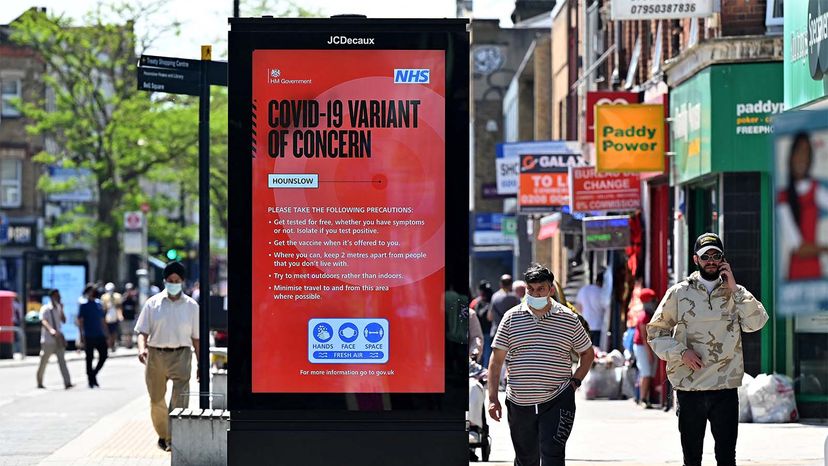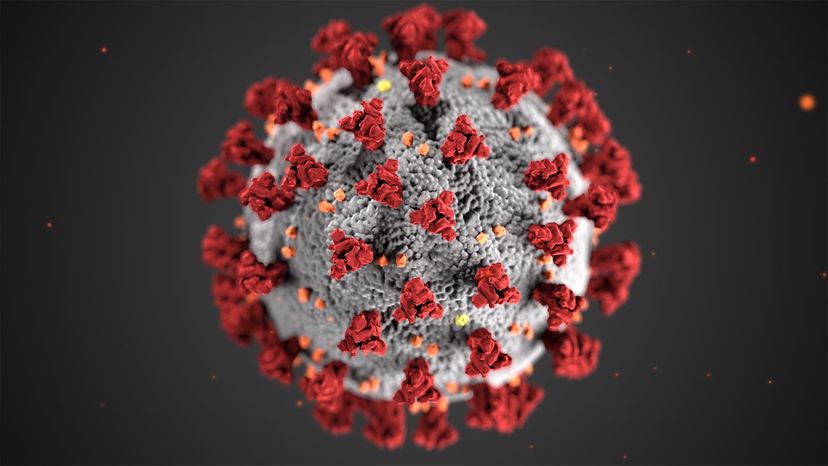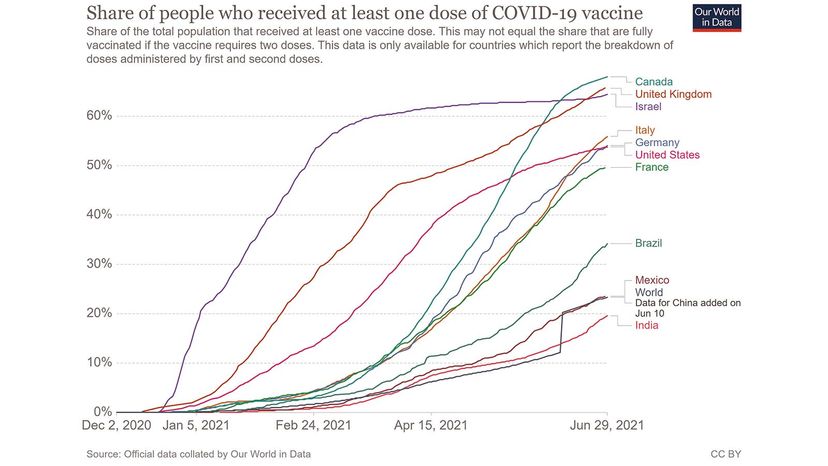 “Pedestrians walk past a sign in Hounslow, west London, warning members of the public about the delta variant of coronavirus. The variant of concern is now responsible for more than 90 percent of cases there. JUSTIN TALLIS/AFP via Getty Images
“Pedestrians walk past a sign in Hounslow, west London, warning members of the public about the delta variant of coronavirus. The variant of concern is now responsible for more than 90 percent of cases there. JUSTIN TALLIS/AFP via Getty Images
There are multiple coronavirus variants circulating around the globe since COVID-19 first emerged as a threat some 18 months ago. The latest one to create concern is the delta variant, first detected December 2020 in India. Considered around 60 percent more transmissible than the already highly infectious alpha variant first detected in the U.K., delta has spread to at least 124 countries, including the United States.
Centers for Disease Control and Prevention (CDC) Director Rochelle Walensky, testified before a Senate committee hearing Tuesday, July 20, that the delta variant is now the most dominant strain in the U.S. and responsible for 83 percent of COVID-19 sequenced samples. In some regions of the country, that percentage is even higher.
Designated by the World Health Organization (WHO) as a global "variant of concern" (VOC), delta was blamed for the deadly wave of infections that decimated India, a country that on June 9, reached a world record daily high of more than 6,000 deaths in one day.
"It potentially could be one of the more difficult viruses to date," says Dr. Paul Goepfert, a professor of medicine at the University of Alabama at Birmingham and an expert in vaccine design.
What Is the Delta Variant?
Coronavirus disease, or COVID-19, is caused by a single species of virus known as SARS-CoV-2. When the original virus, also called "normal," or "wild type," replicates, or copies itself, the sequence of its molecules, called nucleotides, sometimes changes from the original virus. These changes are called mutations. Most of the time, these variations don’t work or make the virus weaker.
But sometimes they can make the virus stronger, more contagious or more resistant to the immune system. These variations of the wild-type virus — or variants — catch the eye of health officials in the global SARS-CoV-2 laboratory network at the WHO’s Virus Evolution Working Group. The group is tasked with quickly detecting variants and assessing their possible impact.
Delta is the fourth global variant of concern WHO has identified since the pandemic began. The three others — alpha, beta and gamma — were first identified in the United Kingdom, South Africa and Brazil, respectively. Scientifically, the delta variant is known as B.1.617.2.
The delta variant has become a VOC due to some mutations in the spike protein, says Mehul Suthar, assistant professor of pediatrics at Emory Vaccine Center and Yerkes National Primate Research Center.
At least four mutations in the delta variant have been associated with faster spread and/or higher infectivity based on previous variants with similar mutations.
 “The spike proteins are those red protrusions rising up from the main "ball," or lipid bilayer membrane, of the virus. Spike proteins are responsible for penetrating host cells and causing infection.Centers for Disease Control
“The spike proteins are those red protrusions rising up from the main "ball," or lipid bilayer membrane, of the virus. Spike proteins are responsible for penetrating host cells and causing infection.Centers for Disease Control
What Are the Symptoms of the Delta Variant?
With the wild coronavirus, you can expect to have symptoms including fever or chills, cough, shortness of breath or difficulty breathing, fatigue, muscle or body aches, loss of taste or smell, nausea or vomiting, or diarrhea.
However, the delta variant appears to be slightly different. Data gathered from the UK’s ZOE COVID Symptom Study app showed people in the U.K. described headaches, sore throats, runny noses and fever to be the No. 1 symptoms.
Blood clots also are a concerning complication of COVID-19. But Dr. Ganesh Manudhane, a cardiologist in Mumbai, India, told Bloomberg he has seen a surprising number and type of blood clots in recent COVID-19 patients across age groups with no past history of abnormal clotting. Several patients developed micro thrombi, or small blood clots, so severe that some developed gangrene and required amputations of fingers or a foot. "We suspect it could be because of the new virus variant," he said.
However, it is important to note that these observations are anecdotal and not based on scientific research at this time.
How Widespread Is Delta in the U.S.?
The mRNA vaccines are proving their worth in countries where shots are more readily available. In the U.S. just less than half (48.3 percent) of the U.S. population is fully vaccinated (55.7 percent are fully and partially vaccinated). But the number of vaccinated need to increase as new cases of COVID-19 have been rising across the United States due to the delta variant.
Ironically, India is home to the world’s largest vaccine manufacturer, but is struggling with a major internal shortage of shots. A little more than 10 percent of the country’s population has received one.
"When you have such a low level of vaccination superimposed upon a variant that has a high degree of efficiency of spread, what you are going to see among undervaccinated regions — be that states, cities or counties — you’re going to see these individual types of blips," Dr. Anthony Fauci, chief medical adviser to the president, told CNN June 29. "It’s almost like it’s going to be two Americas."
This information comes barely a month after a June 22 White House COVID-19 Response Team press briefing when Fauci said cases of the delta variant had already doubled in about two weeks. In early May, the delta variant accounted for just 1.2 percent of cases. Today it accounts for more than 80 percent.
In early May, the dominant strain in the U.S. currently was still the alpha variant, known by the scientific name B.1.1.7. But Fauci warned then that delta would soon become the dominant strain. "The delta variant is currently the greatest threat in the U.S. to our attempt to eliminate COVID-19," he said in the press briefing June 22.
And one age group where cases are climbing the most is among the 12- to 20-year-olds. One reason may be because this age group is among the last to get vaccinated, Goepfert says.
"Initially we try to vaccinate our older population and rightfully so and we’re seeing the benefits of that in decreased hospitalizations," Goepfert says. "But now we’re seeing [infections] that are mainly in younger people and we’re focusing on the fact it’s not a completely benign infection in younger people. They’re not as at-risk but they have problems too with this and some of them get really, really sick."
 “Share of population who have received at least one COVID-19 vaccine.Our World in Data
“Share of population who have received at least one COVID-19 vaccine.Our World in Data
Do COVID Vaccines Protect Against the Delta Variant?
It’s too early to say for sure whether approved COVID-19 vaccines protect against the delta variant, Goepfert says, but early data is promising.
According to a preprint study conducted in the U.K., one dose of the two-dose Pfizer vaccine provided about 33 percent protection against the delta variant. Two doses were 88 percent effective.
No data has been published, to date, on the efficacy of the two other vaccines approved by the Food and Drug Administration (FDA) for emergency use in the U.S. — the two-shot Moderna vaccine or the one-shot Johnson & Johnson vaccine — against the delta variant. But Fauci told Judy Woodruff on PBS News Hour July 20, that believes in the vaccines’ efficacy, but that there will be breakthrough infections among the vaccinated.
"The vaccines protect very well against infection and very, very well against serious disease, but not completely against infection. In fact, if you look at the data from the clinical trials that showed the 93, 94 percent efficacy, that was against clinically recognizable disease. It was not against pure infection, even if the infection was without symptoms," he said. "So, it is not surprising that you are seeing breakthrough infections. The good news is that the people who do get breakthrough infections among vaccinated individuals generally have either no symptoms or very mild symptoms."
Should You Mask Up Indoors Again?
However, the CDC notes the delta variant might be able to avoid the antibodies our bodies produce after a vaccination or coronavirus infection. And for those who do get infected, the monoclonal antibody treatments (or treatments for those who have COVID-19) might be less effective against the delta variant. And that’s not good because a study published June 14 in the science journal the Lancet found that those infected by the delta variant were about twice as likely to be hospitalized than those infected by the alpha variant.
City officials in Los Angeles have taken note and on July 15, the L.A. County Department of Public Health began requiring residents to wear masks again in public indoor spaces, whether they were vaccinated or not. However, the CDC is sticking with the guidelines it set in May that say vaccinated individuals don’t need to wear masks, despite significant pushback.
Both Moderna and Pfizer’s COVID vaccines are made using mRNA technology. Previous studies have shown that a full double-dose of Pfizer’s or Moderna’s vaccine provides 95 percent and 94 percent protection against the original virus, respectively. Johnson & Johnson’s one-shot vaccine, which uses a modified adenovirus, was found 72 percent effective against the wild-type virus.
"This is becoming a pandemic of the unvaccinated," the CDC’s Walensky said during a COVID-19 briefing. More than 99 percent of the deaths in the U.S. are now among the unvaccinated. Getting people vaccinated as quickly as possible is the fastest way out of this pandemic.
Now That’s Interesting
The WHO began naming these coronavirus variants after letters of the Greek alphabet to simplify the scientific names and avoid stigmatizing countries from where the new strains originate. For example, when South Africa identified a mutated strain of the virus fueling its second wave of COVID cases in late 2020, scientists referred to it as 501Y.V2. But media outlets started calling it "the South African variant" instead.
Originally Published: Jun 14, 2021

